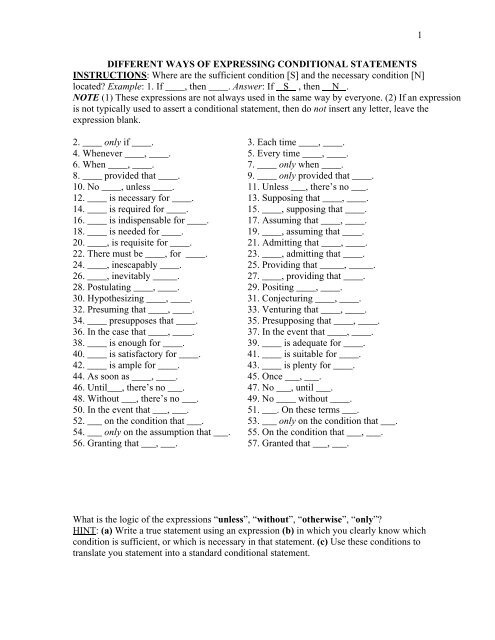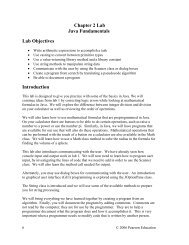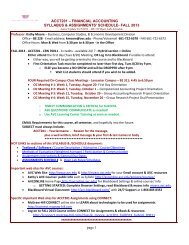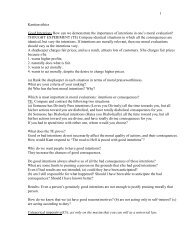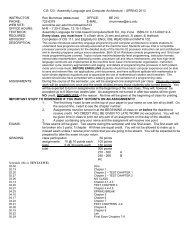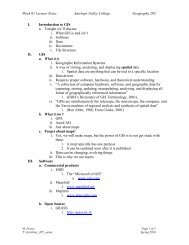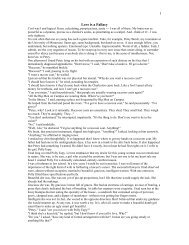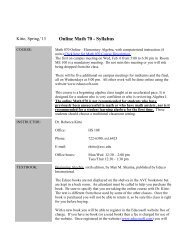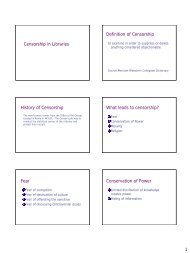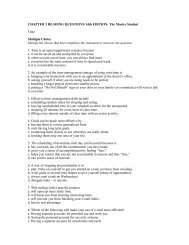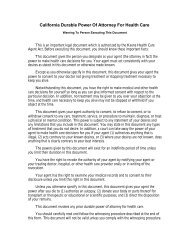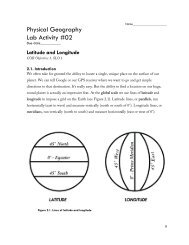DIFFERENT WAYS OF EXPRESSING CONDITIONAL STATEMENTS
DIFFERENT WAYS OF EXPRESSING CONDITIONAL STATEMENTS
DIFFERENT WAYS OF EXPRESSING CONDITIONAL STATEMENTS
You also want an ePaper? Increase the reach of your titles
YUMPU automatically turns print PDFs into web optimized ePapers that Google loves.
1<br />
<strong>DIFFERENT</strong> <strong>WAYS</strong> <strong>OF</strong> <strong>EXPRESSING</strong> <strong>CONDITIONAL</strong> <strong>STATEMENTS</strong><br />
INSTRUCTIONS: Where are the sufficient condition [S] and the necessary condition [N]<br />
located Example: 1. If ____, then ____. Answer: If S , then N .<br />
NOTE (1) These expressions are not always used in the same way by everyone. (2) If an expression<br />
is not typically used to assert a conditional statement, then do not insert any letter, leave the<br />
expression blank.<br />
2. ____ only if ____. 3. Each time ____, ____.<br />
4. Whenever ____, ____. 5. Every time ____, ____.<br />
6. When ____, ____. 7. ____ only when ____.<br />
8. ____ provided that ____. 9. ____ only provided that ____.<br />
10. No ____, unless ____. 11. Unless ___, there’s no ___.<br />
12. ____ is necessary for ____. 13. Supposing that ____, ____.<br />
14. ____ is required for ____. 15. ____, supposing that ____.<br />
16. ____ is indispensable for ____. 17. Assuming that ____, ____.<br />
18. ____ is needed for ____. 19. ____, assuming that ____.<br />
20. ____, is requisite for ____. 21. Admitting that ____, ____.<br />
22. There must be ____, for ____. 23. ____, admitting that ____.<br />
24. ____, inescapably ____. 25. Providing that _____, _____.<br />
26. ____, inevitably _____. 27. ____, providing that ____.<br />
28. Postulating ____, ____. 29. Positing ____, ____.<br />
30. Hypothesizing ____, ____. 31. Conjecturing ____, ____.<br />
32. Presuming that ____, ____. 33. Venturing that ____, ____.<br />
34. ____ presupposes that ____. 35. Presupposing that ____, ____.<br />
36. In the case that ____, ____. 37. In the event that ____, ____.<br />
38. ____ is enough for ____. 39. ____ is adequate for ____.<br />
40. ____ is satisfactory for ____. 41. ____ is suitable for ____.<br />
42. ____ is ample for ____. 43. ____ is plenty for ____.<br />
44. As soon as ____, ____. 45. Once ___, ___.<br />
46. Until___, there’s no ___. 47. No ___, until ___.<br />
48. Without ___, there’s no ___. 49. No ____ without ____.<br />
50. In the event that ___, ___. 51. ___. On these terms ___.<br />
52. ___ on the condition that ___. 53. ___ only on the condition that ___.<br />
54. ___ only on the assumption that ___. 55. On the condition that ___, ___.<br />
56. Granting that ___, ___. 57. Granted that ___, ___.<br />
What is the logic of the expressions “unless”, “without”, “otherwise”, “only”<br />
HINT: (a) Write a true statement using an expression (b) in which you clearly know which<br />
condition is sufficient, or which is necessary in that statement. (c) Use these conditions to<br />
translate you statement into a standard conditional statement.
2<br />
ANSWERS<br />
2. S only if N. 3. Each time S, N.<br />
4. Whenever S, N. 5. Every time S, N.<br />
6. When S, N. 7. S only when N.<br />
8. N provided that S. 9. S only provided that N.<br />
10. No S, unless N. [Nor fire unless oxygen] 11. Unless N, there’s no S. [Unless oxygen, no fire.]<br />
12. N is necessary for S. 13. Supposing that S, N.<br />
14. N is required for S. 15. N, supposing that S.<br />
16. N is indispensable for S. 17. Assuming that S, N.<br />
18. N is needed for S. 19. N assuming that S.<br />
20. N is requisite for S. 21. Admitting that S, N.<br />
22. There must be N for S. 23. N, admitting that S.<br />
24. ____, inescapably ____. 25. Providing that S, N.<br />
26. ____, inevitably _____. 27. N, providing that S.<br />
28. Postulating S, N. 29. Positing S, N.<br />
30. Hypothesizing S, N. 31. Conjecturing S, N.<br />
32. Presuming that S, N . 33. Venturing that S, N.<br />
34. S presupposes that N. 35. Presupposing that S, N.<br />
36. In the case that S, N . 37. In the event that S, N.<br />
38. S is enough for N. 39. S is adequate for N.<br />
40. S is satisfactory for N. 41. S is suitable for N.<br />
42. S is ample for N. 43. S is plenty for N.<br />
44. As soon as S, N. 45. Once S, N.<br />
46. Until N, there’s no S. 47. No S, until N. [No fire until there’s oxygen.]<br />
48. Without N, there’s no S. 49. No S without N. [No fire without oxygen.]<br />
50. In the event that S, N. 51. ___. On these terms, ___.<br />
52. N on the condition that S 53. S only on the condition that N.<br />
54. S only on the assumption that N. 55. On the condition that S, N.<br />
56. Granting that S, N. 57. Granted that S, N.<br />
Expressions 24, 26, and 51 function more as conclusion indicators: the propositions surrounding<br />
them do not constitute a conditional proposition.<br />
For the following exercise, compare you examples to mine.<br />
UNLESS/WITHOUT<br />
(a) Unless you breath, you die. Without breathing, you die. These are obviously true.<br />
(b) The propositions in (a) are expressing: Not breathing is a sufficient condition for dying.<br />
(c) If we express (b) in a standard conditional proposition: IF you do not breath, THEN you die.<br />
Note that in (a) there is no explicit negation, but (b) and (c) show that there is an implicit one.<br />
(a) Unless there is some form of electricity, one cannot use an electric light bulb.<br />
Without some form of electricity, one cannot use an electric light bulb.<br />
These two propositions are obviously true.<br />
(b) The propositions in (a) are expressing: Not having some form of electricity is a sufficient<br />
condition for not being able to use an electric light bulb.
3<br />
(c) If we express (b) in a standard conditional proposition: IF one does not have some form of<br />
electricity, THEN one will not be able to use an electric light bulb.<br />
OTHERWISE<br />
(a) Think correctly some of the time; otherwise you will die. [Assuming no one else will think<br />
correctly for you, and decide for you.] This is obviously true.<br />
(b) The use of “otherwise” is expressing: Not thinking correctly some of the time is sufficient for<br />
[humans] to die.<br />
(c) If we express (b) in a standard conditional proposition: IF you do not think correctly some of<br />
the time, you will die.<br />
Note that in (a) there is no explicit negation, but (b) and (c) show that there is an implicit one.<br />
(a) There has to be water; otherwise one will not be able to grow plants. [Assuming the plants of<br />
planet Earth.] This is obviously true.<br />
(b) The use of “otherwise” is expressing: The absence of water (i.e., no water) is sufficient for<br />
not being able to grow plants.<br />
(c) If we express (b) in a standard conditional proposition: IF there is no water, THEN one will<br />
not be able to grow plants.<br />
ONLY<br />
(a) (i) Only fruits are oranges. (ii) Only oranges are fruits.<br />
Proposition (i) is true, but proposition (ii) is false.<br />
(b) In (i) fruits are a necessary condition for oranges: In (ii) oranges are a necessary condition for<br />
fruits.<br />
(c) Proposition (i) expressed in a standard conditional proposition:<br />
IF something is an orange, THEN it’s a fruit, which is true.<br />
Proposition (ii) expressed in a standard conditional proposition:<br />
IF something is a fruit, THEN it is an orange, which is false.<br />
ONLY IF<br />
(a) There is music only if there is a medium for sound vibration to propagate. This is true.<br />
(b) The proposition in (a) is expressing: The presence of a medium for sound to propagate is a<br />
necessary condition for music.<br />
(c) If we express (b) in a standard conditional proposition: IF there is music, THEN there is a<br />
medium for sound vibration to propagate.


